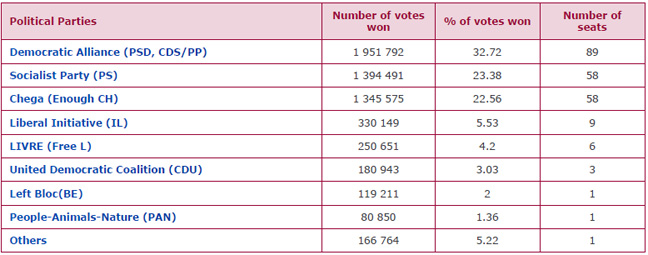Results
Elections in Europe
Corinne Deloy
-

Available versions :
EN

Corinne Deloy
The Democratic Alliance, a coalition comprising the Social Democratic Party (PSD), led by Luis Montenegro, and the Democratic and Social Centre/People's Party (CDS/PP) led by Nuno Melo, came out ahead in Portugal's parliamentary elections on 18 May. The two parties together won 32.72% of the vote and 89 seats, up nine from the previous parliamentary elections on 10 March 2024, in the Assembly of the Republic, the country's single chamber of parliament.
The Socialist Party (PS), the main opposition party led by Pedro Nuno Santos, narrowly took second place with 23.38% of the vote and 58 MPs, down 20 seats from last year.
Chega (Enough) (CH), the far-right party led by André Ventura, won 22.56% of the vote and 58 seats (+8), the same number as the PS. By passing the 20% mark, Chega has made a breakthrough. While the country has long been an exception in Europe as one of the very few (along with Ireland and Malta) without a strong radical right-wing party, those days are now over. ‘The two-party system in Portugal is over,’ André Ventura declared when the results were announced, affirming ‘the end of a 50-year-old political system where change was not possible,’ referring to the time that has passed since the Carnation Revolution in 1974, which brought an end to the dictatorship established by António Salazar in 1933.
The Liberal Initiative (IL), led by Rui Rocha, came fourth with 5.53% and nine MPs (+1). Next came LIVRE (Free) (L), a left-wing environmentalist party led by Rui Tavares, with 4.2% of the vote and six seats (+2); the Democratic Unity Coalition (CDU), an alliance of the Communist Party (PCP), the Ecologist Party-The Greens (PEV) and Democratic Intervention (ID), 3.03% and 3 MPs (+1), the Left Bloc (BE), a radical left-wing party led by Mariana Motagua, with 2% and 1 MP (-4), and finally People-Animals-Nature (PAN), led by Ines Sousa Real, with 1.36% and 1 MP (=).
Turnout was higher than in the previous legislative elections on 10 March 2024, standing at 64.38%, an increase of 4.48 points.
Held 14 months after the last parliamentary elections, this vote, which no one really wanted, came early. It followed the controversy created by the publication of an article in the daily newspaper Correio da Manha on 15 February, which reported suspicions of a conflict of interest involving Luis Montenegro due to the activities of the company Spinumviva, of which he was the owner. The head of government, who was embroiled in the controversy, sought a vote of confidence from Parliament. The vote, which was lost in advance since the PSD did not have an absolute majority, proved unsuccessful. The Prime Minister was therefore forced to resign on 11 March.
The President of the Republic, Marcelo Rebelo de Sousa, decided to call new elections for 18 May.
Results of the general election of 18 May 2025 in Portugal
Turnout: 64.38%

Source : https://www.legislativas2025.mai.gov.pt/resultados/globais
‘The people want this government... and this Prime Minister,’ Luís Montenegro declared when the results were announced. However, the outgoing Prime Minister, who is likely for a third term, does not yet have an absolute majority, even with the support of the Liberal Initiative. The two parties have 98 MPs, 18 short of an absolute majority. Luis Montenegro, who has completely ruled out any collaboration with Chega, is expected to form a minority government and would therefore remain at the mercy of the opposition, which together has a blocking minority. The PS has nevertheless emerged from this election in a very weakened position, and its leader, Pedro Nuno Santos, has already announced his departure from the party leadership.
Luis Montenegro, 52, is from Porto and has a law degree. He worked as a lawyer before being elected to parliament in the elections of 17 March 2002. He was regularly re-elected and resigned from his post in 2018. He was leader of the Social Democratic parliamentary group between 2011 and 2017. In 2022, he was elected president of the PSD with 72.5% of the vote. He led the party to victory in the March 2024 general election and consequently became prime minister. After resigning on 11 March and winning the general election on 18 May, he is expected to be reappointed to his post.
On the same theme
To go further
Elections in Europe
Helen Levy
—
10 February 2026
Elections in Europe
Corinne Deloy
—
20 January 2026
Elections in Europe
Corinne Deloy
—
13 January 2026
Elections in Europe
Corinne Deloy
—
4 November 2025

The Letter
Schuman
European news of the week
Unique in its genre, with its 200,000 subscribers and its editions in 6 languages (French, English, German, Spanish, Polish and Ukrainian), it has brought to you, for 15 years, a summary of European news, more needed now than ever
Versions :

